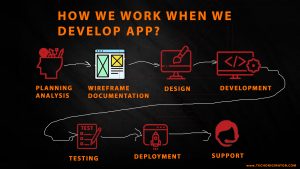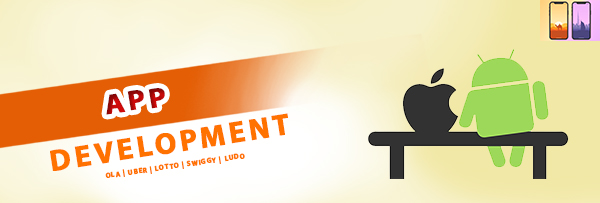App Development
What is App development?
Mobile application development is the process of making software for smartphones, tablets and digital assistants, most commonly for the Android and iOS operating systems.
In our team we work on both- (a) Android app work on android mobile. (b) IOS app : work on Apple mobile.
Benefits of app for any business :
Why anyone have app for their business?
1. Staying ‘front of mind’ with customers – your app on someone’s home screen can help reinforce you as the answer to their needs when they require what you offer: especially if your app is helpful in other ways.
2. Ease of access – for the user, clicking your app is far quicker and easier than accessing yours or a competitor’s website even if they’ve bookmarked it.
3. Data capture – valuable data can be gathered from apps concerning use, activity and buying habits.
4. Management – Handle all management stuff like records and job details so organization perform well.
5. Staff interaction – information can be passed quickly and easily to staff whether for those accessing an internal company portal or people working in remote locations.
6. Productivity – app-based interactions can streamline communications with staff and outside contractors. And then you can ditch labor intensive paper-based reporting.
7. Automation – Things get automated so many job gets done by algorithms using AI.
8.Communication – it’s easier to interact with your customers and prospects with an app including the immediacy of being able to attract their attention and maybe prompt action through, for example, push notification
Type of App
1.Hybrid app : In this we develop single code and build app which will work on both platform(mobile) android and ios.
2. Native app : In this we develop code for both platform ( mobile )and build app.
3. Web app : A web application is software that runs in your web browser. Businesses have to exchange information and deliver services remotely.
Difference between NATIVE & HYBRID in points
Native and Hybrid are two difference approaches to developing mobile applications. Here are the key differences between them in points:
Native Mobile App:
- Platform-specific: Native apps are developed specifically for a particular mobile operating system, such as iOS (using Swift or Objective-C) or Android (using Java or Kotlin).
- Performance: Native apps tend to offer better performance because they are optimized for the underlying hardware and software of the target platform.
- User Experience: Native apps provide a seamless and consistent user experience, as they adhere to the design guidelines and conventions of the respective platforms.
- Access to Device Features: Native apps have full access to the device’s hardware features and capabilities, such as the camera, GPS, and sensors, allowing for rich and integrated functionality.
- App Store Distribution: Native apps are typically distributed through platform-specific app stores (Apple App Store and Google Play Store), which can provide a level of trust and visibility to users.
- Development Time and Cost: Developing separate native apps for different platforms can be more time-consuming and costly due to the need for separate codebases and skill sets.
- Updates: Updates for native apps need to be separately developed and pushed to each platform’s app store, which can require additional time and effort.
Hybrid Mobile App:
- Cross-Platform: Hybrid apps are developed using web technologies (HTML, CSS, JavaScript) and are wrapped in a native container. They can run on multiple platforms with minimal code changes.
- Performance: Hybrid apps may not offer the same level of performance as native apps, as they rely on web views for rendering content and may not fully utilize platform-specific optimizations.
- User Experience: While hybrid apps aim to provide a consistent look and feel across platforms, achieving a truly native user experience can be challenging, and there may be differences in behavior and performance.
- Access to Device Features: Hybrid apps can access device features through plugins, but they may not have as deep integration as native apps, and plugin availability can vary.
- App Store Distribution: Hybrid apps can be distributed through app stores like native apps, but they may face limitations in terms of discoverability and trust.
- Development Time and Cost: Developing hybrid apps can be faster and more cost-effective than building separate native apps for each platform, as a single codebase can be used for multiple platforms.
- Updates: Hybrid apps can be updated more easily and quickly, as changes to the web code can be applied across all platforms simultaneously.
Languages Use In NATIVE & HYBRID
Native- There are many languages used in native app development like – Java, Kotlin, Swift, Objective-C, C/C++, C#, JavaScript.
Note: But we only work on Java and swift.
Hybrid- There are many languages used in hybrid app development like- Ionic, React Native, Flutter, Xamarin, Apache Cordova (PhoneGap), Sencha Touch.
Note: But we only work on Flutter.
How we develop app? What is a process?

Ask to client this:
- Need android & iOS both or anyone of this?
- Need Hybrid or Native app?
- Features required in app?
How to calculate Charges for app development?
- Try to find out total time required (time depends on number of features client needs in App and quality of work client is expecting.)
- Try to find number of manpower required.( if urgent task manpower may require more)
- How much urgent job is?
- How much tough task is?
- Is very experienced developer required ?

